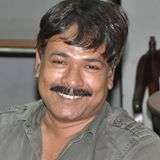Rashid Askari
| Harun-ur-Rashid Askari | |
|---|---|
| রাশিদ আসকারী | |
 Askari in June 2013 | |
| Vice-Chancellor of Islamic University | |
|
Assumed office 21 August 2016 | |
| Personal details | |
| Born |
1 June 1965 Ashkarpur, Mithapukur, Rangpur, East Pakistan, Present day Bangladesh |
| Nationality | Bangladeshi |
| Alma mater | |
| Occupation | university academic, writer |
Harun-ur-Rashid Askari (born 1 June 1965) "is a Bengali-English writer, fictionist, columnist and an academic in Bangladesh".[1] He is the current and the 12th vice-chancellor of Islamic University, Bangladesh.[2]
Early life
Askari was born in Ashkarpur, Mithapukur, Rangpur in 1965. He "obtained Honours and Master’s degrees in English from Dhaka University with distinction, and a PhD in Indian English Literature from the University of Poona".[3]
Career
Askari joined Islamic University, Kushtia as a lecturer in English in 1990. He became a professor in 2005 and was head of the English department more than once. He was elected the Secretary General of Federation of Bangladesh University Teachers' Association for 2014.[4] He was "made new chairman of Folklore Studies Department of the university in Kushtia".[5] He is a peer reviewer and a Quality Assurance(QA) expert nominated by the Quality Assurance Unit of the Government of People's Republic of Bangladesh.[6] "...Askari regularly writes columns in various newspapers"...[3] "The areas of his academic interest include Modern and Postmodern Fiction, Colonial and Postcolonial Literatures, South-Asian Writing in English, Literary Theories and Creative Writing".[7]
Writing style
An unsigned profile in The Kushtia Times stated that Askari writes "both Bengali and English with equal ease and efficiency".[8] Bangladeshi novelist and critic Syed Manzoorul Islam notes: "He writes witty, racy stories with surprisingly serious undertones. Picking real-life events from the remote areas and the marginal people of the country and weaving them into various fictional forms are the hallmarks of his storytelling. ... Though not new in a ground-breaking way, his stories are both intense and original. The overall tone of his language is gently sarcastic ...".[9] "Dr. Askari has demonstrated enough artistic talent to come up with fiction in English, which must be a source of inspiration for many of us".[3]
Bibliography
Books
- Askari, Rashid (1996). মুমূর্ষ স্বদেশ [The Dying Homeland] (in Bengali). Dhaka.
- —— (1996). [Indo-English Literature and Others] (in Bengali). Dhaka.
- —— (1997). [Today's Folktale] (in Bengali). Dhaka.
- —— (2001). বিনির্মিত ভাবনা [Deconstructing Thoughts] (in Bengali). Dhaka.
- —— (2002). উত্তরাধুনিক সাহিত্য ও সমালোচনা তত্ত্ব [Postmodern Literary and Critical Theory] (in Bengali). Dhaka.
- —— (2010). The Wounded Land: Peoples, Politics, Culture, Literature, Liberation War, War Crimes, and Militancy in Bangladesh. Dhaka: Pathak Shamabesh. OCLC 708243896.
- —— (2011). Nineteen seventy one and other stories: a collection of short stories. Dhaka: Pathak Shamabesh. ISBN 978-9848866436.
- —— (2012–13). English Writings of Tagore(3 volumes). Dhaka: Pathak Shamabesh. ISBN 978-984-8866-40-5.
Articles
- Askari, Rashid (3 August 2011). "Lottery". Contemporary Literary Review India. Archived from the original on 23 October 2013.
- —— (December 2011). "Nineteen seventy one" (PDF). Journal of Postcolonial Cultures and Societies. Wright State University. 2 (4): 118–122. ISSN 1948-1845.
- —— (December 2011). "Future of literature: Global Art-Malady and its Consequences" (PDF). Litsearch. M. A. Hafiz Siddiqui. 1 (1): 1–4. ISSN 2277-6990.
- —— (January 2012). "Jihad". Contemporary Literary Review India: 15–18. ISSN 2250-3366.
- —— (June 2012). "Locked-in Syndrome". Contemporary Literary Review India: 33–40. ISSN 2250-3366.
- —— (15 December 2007). "War crime and the criminal". The Brunei Times.
- —— (14 March 2012). "Eve-teasing in Bangladesh: Crime and punishment". African Herald Express. Archived from the original on 15 March 2012.
- —— (14 March 2012). "Psychological torture on women and the legal cure". African Herald Express. Archived from the original on 18 March 2012.
- —— (10 April 2012). "Population explosion and the fate of mankind". African Herald Express. Archived from the original on 22 April 2012.
- —— (10 May 2012). "Bangladesh's conquest of the sea: a daunting prospect". African Herald Express. Archived from the original on 29 June 2012.
- —— (17 February 2013). "Historic 21 February and the birth of a nation". African Herald Express.
- —— (5 May 2013). "The biggest industrial disaster in Bangladesh". African Herald Express. Archived from the original on 15 June 2013.
References
- ↑ "A brief history of Bangladeshi writing in English". The Missing Slate. 1 October 2015. Retrieved 9 July 2017.
- ↑ "Rashid Askari made IU VC". New Age. 22 August 2016. Retrieved 25 August 2016.
- 1 2 3 "A Talk with IU VC". Daily Sun. Dhaka. 18 September 2016. Archived from the original on 6 March 2017.
- ↑ "Farid made president, Rashid secy gen of FBUTA". New Age. Dhaka. BSS. 9 March 2014.
- ↑ "IU Folklore Dept gets new chairman". The Financial Express. Dhaka. BSS. 21 January 2016.
- ↑ "Peer Reviewers Panel (QA experts)" (PDF). Quality Assurance Unit, University Grants Commission. Archived from the original (PDF) on 21 September 2016.
- ↑ http://www.sangatreview.org/rashid-askari/
- ↑ "Profile of the week--Dr. Rashid Askari: Fiction writer, critic, columnist, teacher, and social analyst". The Kushtia Times. 9 January 2012.
- ↑ Islam, Syed Manzoorul (16 February 2012). "Nineteen seventy one and other stories: a collection of short stories". Dhaka Courier. Archived from the original on 23 May 2013.
- "The Wounded Land: A Reflection on today's Bangladesh". Dhaka Courier. 23 January 2011 – via HighBeam Research. (Subscription required (help)).
- "Curriculum Vitae: Rashid Askari" (PDF). Islamic University, Kushtia. Retrieved 12 November 2013.